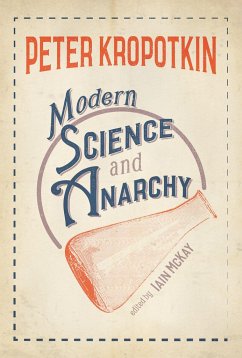Peter Kropotkin
Modern Science and Anarchy
21,99 €
inkl. MwSt.
Versandfertig in über 4 Wochen

11 °P sammeln
Peter Kropotkin
Modern Science and Anarchy
- Broschiertes Buch
- Merkliste
- Auf die Merkliste
- Bewerten Bewerten
- Teilen
- Produkt teilen
- Produkterinnerung
- Produkterinnerung
Assembled in English for the first time, an unabridged gem from anarchism's famous theorist.
Andere Kunden interessierten sich auch für
![We Do Not Fear Anarchy?we Invoke It We Do Not Fear Anarchy?we Invoke It]() Robert GrahamWe Do Not Fear Anarchy?we Invoke It16,99 €
Robert GrahamWe Do Not Fear Anarchy?we Invoke It16,99 €![Anarchy Anarchy]() Errico MalatestaAnarchy9,99 €
Errico MalatestaAnarchy9,99 €![Talking Anarchy Talking Anarchy]() Colin WardTalking Anarchy12,99 €
Colin WardTalking Anarchy12,99 €![Relationship Anarchy Relationship Anarchy]() Pérez-CortésRelationship Anarchy17,99 €
Pérez-CortésRelationship Anarchy17,99 €![Freedom, Anarchy and the Law Freedom, Anarchy and the Law]() Richard TaylorFreedom, Anarchy and the Law22,99 €
Richard TaylorFreedom, Anarchy and the Law22,99 €![Floodgates of Anarchy Floodgates of Anarchy]() Stuart ChristieFloodgates of Anarchy13,99 €
Stuart ChristieFloodgates of Anarchy13,99 €![Anarchy Anarchy]() Errico MalatestaAnarchy6,99 €
Errico MalatestaAnarchy6,99 €-
-
-
Assembled in English for the first time, an unabridged gem from anarchism's famous theorist.
Produktdetails
- Produktdetails
- Verlag: AK Press
- Seitenzahl: 528
- Altersempfehlung: ab 12 Jahre
- Erscheinungstermin: 15. Mai 2018
- Englisch
- Abmessung: 228mm x 151mm x 35mm
- Gewicht: 724g
- ISBN-13: 9781849352741
- ISBN-10: 1849352747
- Artikelnr.: 48810185
- Herstellerkennzeichnung
- Libri GmbH
- Europaallee 1
- 36244 Bad Hersfeld
- gpsr@libri.de
- Verlag: AK Press
- Seitenzahl: 528
- Altersempfehlung: ab 12 Jahre
- Erscheinungstermin: 15. Mai 2018
- Englisch
- Abmessung: 228mm x 151mm x 35mm
- Gewicht: 724g
- ISBN-13: 9781849352741
- ISBN-10: 1849352747
- Artikelnr.: 48810185
- Herstellerkennzeichnung
- Libri GmbH
- Europaallee 1
- 36244 Bad Hersfeld
- gpsr@libri.de
Peter Kropotkin (1842-1921) was one of anarchism's most famous thinkers. His classic works include The Conquest of Bread; Fields, Factories and Workshops; Memoirs of a Revolutionist; and Mutual Aid: A Factor of Evolution. Iain McKay is editor of An Anarchist FAQ (Vols. I and II), Direct Struggle against Capital: A Peter Kropotkin Anthology, and Property is Theft!: A Pierre Joseph-Proudhon Anthology.
Introduction: Reality has a Well-known Libertarian Basis, by Iain McKay
Preface
Part I: Modern Science and Anarchy
I. The Origins of Anarchy
II. The Intellectual Movement of the Eighteenth Century
III. The Reaction at the beginning of the Nineteenth Century
IV. The Positive Philosophy of Comte
V. The Awakening in the Years 1856-1862
VI. The Synthetic Philosophy of Spencer
VII. The Role of Law in Society
VIII. The Position of Anarchy in Modern Science
IX. The Anarchist Ideal and Previous Revolutions
X. Anarchy
Principles
Anarchist Ideas amongst the Ancients; in the Middle Ages-Proudhon-Stirner
XI. Anarchy (continued)
Socialist Ideas in the International-Authoritarian Communists and
Mutualists
Socialist Ideas in the International-Saint-Simonism
XII. Anarchy (continued)
Socialist Ideas in the International-Fourierism
The Impulse given by the Commune-Bakunin
XIII. Anarchy (continued)
The Anarchist Concept as it appears today
The Negation of the State
The Individualist Current
XIV. Some Conclusions of Anarchy
XV. The Means of Action
XVI. Conclusion
Part II
Communism and Anarchy
I. Anarchist Communism
II. Authoritarian Communism-Communist Communities
III. Small communist communities. Causes of their failures
IV. Does Communism imply the diminishing of the individual?
Part III
The State: Its Historic Role
Part IV
The Modern State
I. The Essential Principle of Modern Society
II. Serfs of the State
III. Taxation as a Means of Increasing the Power of the State
IV. Taxation a Means of Enriching the Wealthy
V. Monopolies
VI. Monopolies in the Nineteenth Century
VII. Monopolies in constitutional England and Germany-Kings of the epoch
VIII. War
Industrial Rivalries
High Finance
IX. War and Industry
Industrial crises due to anticipation of war
X. The Essential Characteristics of the State
XI. Can the State be used for the emancipation of the workers?
XII. The modern constitutional State
XIII. Is it sensible to strengthen the current State?
XIV. Conclusions
Part V
Appendix
I. Explanatory Notes
II. Hebert Spencer: His Philosophy
Supplementary Material
Anarchy: Its Philosophy, Its Ideal
A lecture which was to be held on March 6th, 1896, in the Tivoli-Vauxhall
theatre in Paris
Co-operation: A Reply to Herbert Spencer
Index
Preface
Part I: Modern Science and Anarchy
I. The Origins of Anarchy
II. The Intellectual Movement of the Eighteenth Century
III. The Reaction at the beginning of the Nineteenth Century
IV. The Positive Philosophy of Comte
V. The Awakening in the Years 1856-1862
VI. The Synthetic Philosophy of Spencer
VII. The Role of Law in Society
VIII. The Position of Anarchy in Modern Science
IX. The Anarchist Ideal and Previous Revolutions
X. Anarchy
Principles
Anarchist Ideas amongst the Ancients; in the Middle Ages-Proudhon-Stirner
XI. Anarchy (continued)
Socialist Ideas in the International-Authoritarian Communists and
Mutualists
Socialist Ideas in the International-Saint-Simonism
XII. Anarchy (continued)
Socialist Ideas in the International-Fourierism
The Impulse given by the Commune-Bakunin
XIII. Anarchy (continued)
The Anarchist Concept as it appears today
The Negation of the State
The Individualist Current
XIV. Some Conclusions of Anarchy
XV. The Means of Action
XVI. Conclusion
Part II
Communism and Anarchy
I. Anarchist Communism
II. Authoritarian Communism-Communist Communities
III. Small communist communities. Causes of their failures
IV. Does Communism imply the diminishing of the individual?
Part III
The State: Its Historic Role
Part IV
The Modern State
I. The Essential Principle of Modern Society
II. Serfs of the State
III. Taxation as a Means of Increasing the Power of the State
IV. Taxation a Means of Enriching the Wealthy
V. Monopolies
VI. Monopolies in the Nineteenth Century
VII. Monopolies in constitutional England and Germany-Kings of the epoch
VIII. War
Industrial Rivalries
High Finance
IX. War and Industry
Industrial crises due to anticipation of war
X. The Essential Characteristics of the State
XI. Can the State be used for the emancipation of the workers?
XII. The modern constitutional State
XIII. Is it sensible to strengthen the current State?
XIV. Conclusions
Part V
Appendix
I. Explanatory Notes
II. Hebert Spencer: His Philosophy
Supplementary Material
Anarchy: Its Philosophy, Its Ideal
A lecture which was to be held on March 6th, 1896, in the Tivoli-Vauxhall
theatre in Paris
Co-operation: A Reply to Herbert Spencer
Index
Introduction: Reality has a Well-known Libertarian Basis, by Iain McKay
Preface
Part I: Modern Science and Anarchy
I. The Origins of Anarchy
II. The Intellectual Movement of the Eighteenth Century
III. The Reaction at the beginning of the Nineteenth Century
IV. The Positive Philosophy of Comte
V. The Awakening in the Years 1856-1862
VI. The Synthetic Philosophy of Spencer
VII. The Role of Law in Society
VIII. The Position of Anarchy in Modern Science
IX. The Anarchist Ideal and Previous Revolutions
X. Anarchy
Principles
Anarchist Ideas amongst the Ancients; in the Middle Ages-Proudhon-Stirner
XI. Anarchy (continued)
Socialist Ideas in the International-Authoritarian Communists and
Mutualists
Socialist Ideas in the International-Saint-Simonism
XII. Anarchy (continued)
Socialist Ideas in the International-Fourierism
The Impulse given by the Commune-Bakunin
XIII. Anarchy (continued)
The Anarchist Concept as it appears today
The Negation of the State
The Individualist Current
XIV. Some Conclusions of Anarchy
XV. The Means of Action
XVI. Conclusion
Part II
Communism and Anarchy
I. Anarchist Communism
II. Authoritarian Communism-Communist Communities
III. Small communist communities. Causes of their failures
IV. Does Communism imply the diminishing of the individual?
Part III
The State: Its Historic Role
Part IV
The Modern State
I. The Essential Principle of Modern Society
II. Serfs of the State
III. Taxation as a Means of Increasing the Power of the State
IV. Taxation a Means of Enriching the Wealthy
V. Monopolies
VI. Monopolies in the Nineteenth Century
VII. Monopolies in constitutional England and Germany-Kings of the epoch
VIII. War
Industrial Rivalries
High Finance
IX. War and Industry
Industrial crises due to anticipation of war
X. The Essential Characteristics of the State
XI. Can the State be used for the emancipation of the workers?
XII. The modern constitutional State
XIII. Is it sensible to strengthen the current State?
XIV. Conclusions
Part V
Appendix
I. Explanatory Notes
II. Hebert Spencer: His Philosophy
Supplementary Material
Anarchy: Its Philosophy, Its Ideal
A lecture which was to be held on March 6th, 1896, in the Tivoli-Vauxhall
theatre in Paris
Co-operation: A Reply to Herbert Spencer
Index
Preface
Part I: Modern Science and Anarchy
I. The Origins of Anarchy
II. The Intellectual Movement of the Eighteenth Century
III. The Reaction at the beginning of the Nineteenth Century
IV. The Positive Philosophy of Comte
V. The Awakening in the Years 1856-1862
VI. The Synthetic Philosophy of Spencer
VII. The Role of Law in Society
VIII. The Position of Anarchy in Modern Science
IX. The Anarchist Ideal and Previous Revolutions
X. Anarchy
Principles
Anarchist Ideas amongst the Ancients; in the Middle Ages-Proudhon-Stirner
XI. Anarchy (continued)
Socialist Ideas in the International-Authoritarian Communists and
Mutualists
Socialist Ideas in the International-Saint-Simonism
XII. Anarchy (continued)
Socialist Ideas in the International-Fourierism
The Impulse given by the Commune-Bakunin
XIII. Anarchy (continued)
The Anarchist Concept as it appears today
The Negation of the State
The Individualist Current
XIV. Some Conclusions of Anarchy
XV. The Means of Action
XVI. Conclusion
Part II
Communism and Anarchy
I. Anarchist Communism
II. Authoritarian Communism-Communist Communities
III. Small communist communities. Causes of their failures
IV. Does Communism imply the diminishing of the individual?
Part III
The State: Its Historic Role
Part IV
The Modern State
I. The Essential Principle of Modern Society
II. Serfs of the State
III. Taxation as a Means of Increasing the Power of the State
IV. Taxation a Means of Enriching the Wealthy
V. Monopolies
VI. Monopolies in the Nineteenth Century
VII. Monopolies in constitutional England and Germany-Kings of the epoch
VIII. War
Industrial Rivalries
High Finance
IX. War and Industry
Industrial crises due to anticipation of war
X. The Essential Characteristics of the State
XI. Can the State be used for the emancipation of the workers?
XII. The modern constitutional State
XIII. Is it sensible to strengthen the current State?
XIV. Conclusions
Part V
Appendix
I. Explanatory Notes
II. Hebert Spencer: His Philosophy
Supplementary Material
Anarchy: Its Philosophy, Its Ideal
A lecture which was to be held on March 6th, 1896, in the Tivoli-Vauxhall
theatre in Paris
Co-operation: A Reply to Herbert Spencer
Index







